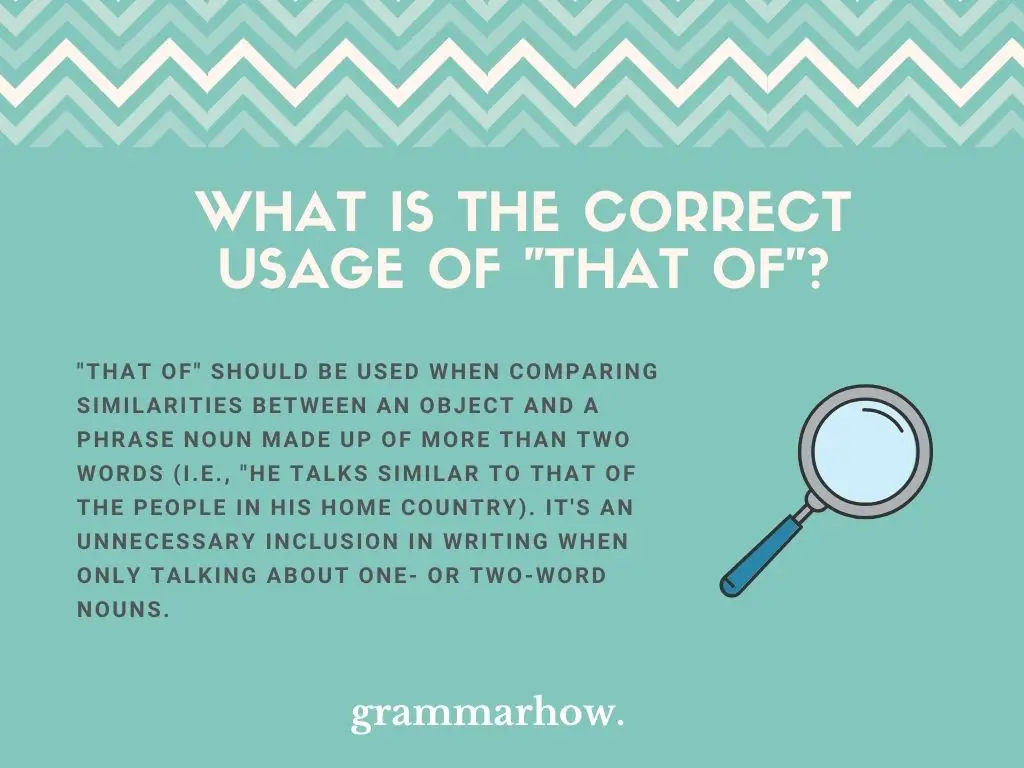When using “that of,” it’s important to understand where it belongs. You can’t always use it, and there are very specific circumstances where it makes the most sense. In this article, we’ll explore the ideas that come with its use.
What Is The Correct Usage Of “That Of”?
“That of” should be used when comparing similarities between an object and a phrase noun made up of more than two words (i.e., “he talks similar to that of the people in his home country). It’s an unnecessary inclusion in writing when only talking about one- or two-word nouns.

What Does “That Of” Mean?
When we use “that of,” it means that we’re making a comparison. There are no other situations where you can use it. Usually, that comparison is used between a larger group of entities.
“That of” means that one thing is compared to another. Usually, we refer to one object being compared to a larger group of objects in some way.
We can’t use “that of” in cases where we’re only talking about one or two objects. It needs to be made clear that it’s a larger group of objects.
- His problem is similar to that of his family.
- His problem is similar to that of the people he knows and loves.
In these examples, “that of” is unnecessary in the first one. We’re using “his family” as the phrase noun (which is only two words). However, the phrase noun in the second one is “the people he knows and loves,” which is longer than two words; thus, “that of” is correct.
Incidentally, to make the first example correct, we should write it as follows:
- His problem is similar to his family’s.
Is It Ever Grammatically Incorrect To Use “That Of”?
To help you understand when “that of” doesn’t work, we’ll explore some times where it’s grammatically incorrect.
“That of” is grammatically incorrect when you’re only using one or two nouns in the phrase noun to compare with something. Instead, you can simply use “to” in its place.
The sentences that you’ll create using “that of” with only a few words after it is difficult to read. It makes it look clunky, and many native readers disagree with it.
- He knew he was similar to that of his father.
- My issues are just like that of Dave’s.
- Her partner is cruel like that of Sarah.
All of these examples are grammatically incorrect. In each case, we’re only using one (“Dave’s” and “Sarah”) or two (“his father”) words in the noun to compare with something. The sentence becomes jarring, and “that of” isn’t required.
Instead, we should write the following:
- He knew he was similar to his father.
- My issues are just like Dave’s.
- Her partner is cruel like Sarah.
Examples Of How To Use “That Of” In A Sentence
Let’s go through some examples of when “that of” is correct to use. This way, you’ll be able to figure out when we are best equipped to use it. Make sure you read through this closely, so you understand what we’re talking about.
“That of” only works in cases where the phrase noun is longer than two words.
- He needs to change his view like that of the rest of the population of his city.
- We should think longer about this to help understand that of the Western congregation.
- I can’t get over my problems being the same as that of a celebrity that I know and love.
- My salary is similar to that of what a teacher might make.
These examples show when we would use “that of” in a sentence. It’s important to remember that when we do use that many words, even if we’re referring to a large group, it’s still written in the singular form.
When Should I Use “That Of” Vs. “Those Of”?
“That of” is used when we’re talking about entities in the singular form. “Those of” is used when we’re talking about entities in the plural form.
That means that if the group we’re talking about only has one thing that we’re comparing (like an issue or a salary), we will use “that of.” If the group has multiple things in common with the comparison, then we’d use “those of.”
- You should be thankful your problem isn’t like that of the rest of the country.
- My problems aren’t like those of the rest of the world, at least.

Martin holds a Master’s degree in Finance and International Business. He has six years of experience in professional communication with clients, executives, and colleagues. Furthermore, he has teaching experience from Aarhus University. Martin has been featured as an expert in communication and teaching on Forbes and Shopify. Read more about Martin here.
